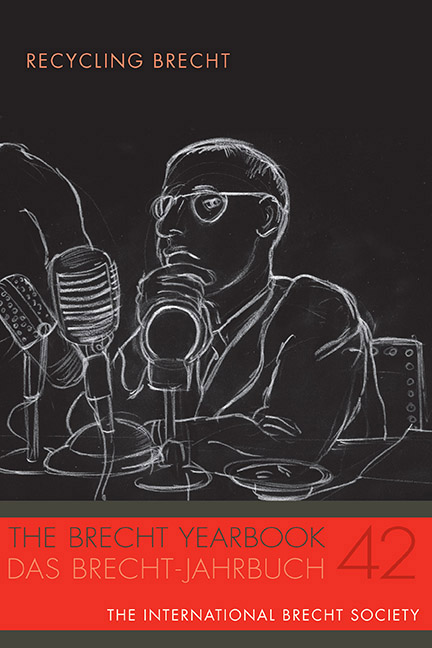Zoe Beloff. A World Redrawn: Eisenstein and Brecht in Hollywood. New York: Christine Burgin, 2016. 152 pages.
Published online by Cambridge University Press: 09 April 2021
Summary
New York-based artist Zoe Beloff talks with people from the past: rather than dead objects of study, they become her comrades and collaborators, she writes (6). In A World Redrawn, Beloff thus converses with Bertolt Brecht and Sergei Eisenstein, who both spent time in Hollywood but left without seeing their ambitions realized. Invited by Paramount Studios in the wake of the success of his Battleship Potemkin (1925), Eisenstein stayed for six months in 1930. The studio rejected all of his ideas. Brecht, on the other hand, arrived as a refugee from Nazi Germany and worked in the Dream Factory for six years, between 1941 and 1947. Of his many film treatments, only one was turned into a film: he co-wrote the script for Hangmen Also Die. Beloff's conversation with the two takes their experiences in Los Angeles as points of departure. The overall result is a quirky, smart, and thought-provoking book whose release follows an exhibition of the material and artwork compiled in A World Redrawn at the James Gallery at the Graduate Center, City University of New York in 2015.
Unlike a conventional academic, Beloff engages with Brecht and Eisenstein creatively. Not only does she analyze their ideas on art and politics, she adopts them in her films. A World Redrawn includes scripts to three of her short movies: Two Marxists in Hollywood; The Glass House, based on one of Eisenstein's ideas; and A Model Family, which draws on Brecht's notes for a play. In addition, the book offers three substantial academic essays: Beloff's A World Redrawn presents an in-depth look at her creative research process and practice. Hannah Frank pens a fascinating cross-cultural history of Russian and American animation in “The Potential of Pochta: Unlikely Affinities between American and Soviet Animation, 1929–1948.” A delightful drawing of an Eisenstein-inspired character accompanies the pages of Esther Leslie's essay, “Those in Glass Houses Laugh,” on the role of laughter in explicitly political art: for the span of twelve pages, A World Redrawn turns into a cheeky flipbook. The anthology also includes film stills and poster reproductions that are part of Beloff's visual oeuvre, and archival material, such as handwritten notes and sketches from the Bertolt Brecht Archive in Berlin and the Russian Archive for Literature and Art (RGALI) in Moscow. Beloff's unorthodox approach ultimately succeeds in demonstrating the acute timeliness of Brecht's and Eisenstein's thought.
- Type
- Chapter
- Information
- The Brecht Yearbook / Das Brecht-Jahrbuch 42Recycling Brecht, pp. 265 - 267Publisher: Boydell & BrewerPrint publication year: 2018

